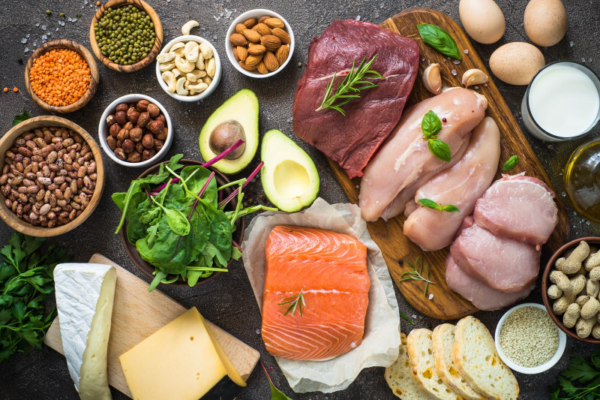Exercise, Nutrition, & Hormones. What’s the link?
by Betty – Thursday, 1. October 2020
Exercise, Nutrition, Hormones
To borrow a quote from Reese Witherspoon as Elle Woods in Legally Blonde, “Exercise gives you endorphins. Endorphins make you happy. Happy people don’t kill their husbands. They just don’t.” Maybe it is not so simple, but Elle does have a point. Exercise and nutrition affect our hormone levels and influence so many aspects of our life including our mood.
What are hormones?
Hormones are chemicals that control cellular functions. They are released by an organ into the bloodstream so that they can deliver their message to cells in another part of the body. These functions are widespread across metabolism, mood, reproduction, tissue growth, and degradation of muscles.
What hormones are affected when we exercise?
-
Endorphins, Dopamine, and Serotonin
Endorphins are neurotransmitters released by the pituitary gland, located at the base of your brain. They reduce your perception of pain as well as act as a sedative. They also trigger a feeling of happiness.
Dopamine is another neurotransmitter involved with motivation, reward, and memory. The feeling of pleasure and reward it creates encourages you to repeat specific actions. Release of dopamine after a workout helps you stick to regular exercise.
Serotonin controls your overall well being by improving sleep cycle, mood, appetite, and digestion.

-
Testosterone
Testosterone is present in everyone although at different levels in men and women. The right amount of testosterone is important for everyone to preserve health and reduce risk of obesity, type 2 diabetes, and heart conditions. In men, testosterone is responsible for muscles mass, sex drive, and sperm count. Exercise affects the production of testosterone through muscle building and weight maintenance. Weight lifting and HIIT are shown to give the biggest boost in testosterone level.
-
Estrogen
In women, estrogen plays an essential role in cognitive function. During menopause, estrogen naturally declines significantly. Some of the side effects are hot flashes, night sweats, and mood changes. However, you can soften the side effects by adding regular exercise to your lifestyle.
-
Cortisol
This is released during periods of stress (either mental or physical stress like exercise) to activate your “fight or flight” mode. As your fitness improves, your body gets better at dealing with stress and releases less cortisol. This applies not only during exercise but also in response to emotional stress.
Too much cortisol for too long can be counterproductive to your fitness progress. It can lead to an increase in blood pressure, abdominal fat, and reduction of muscle composition. You can avoid this by lowering the length of your workout, fueling with proper food, and leaving your more intense workout session to later in the day when your cortisol levels are lower.
-
Insulin
Insulin is a hormone that controls sugar and amino acids uptake within cells. High levels of insulin can lead to heart disease, diabetes and cancer. Another possible complication is insulin resistance, or insulin insensitivity, where insulin levels are normal but your cells don’t respond to it. Although nutrition plays a huge role in the amount of insulin production, studies have shown exercise also reduces insulin level and increases insulin sensitivity.
Other Ways to Regulate our Hormones: Nutrition

-
Eating Enough Protein
Protein is made up of building blocks called amino acids. Protein reduces the release of the “hunger hormone” ghrelin. It also produces hormones such as PYY and GLP-1 that help you feel full.
-
Reducing Sugar and Refined Carbs
Most types of sugar are made up of fructose. Fructose and food with high refined carbs are linked to an increase in insulin levels as well as insulin resistance. Try replacing these foods with whole foods and a high fiber diet.
-
Increasing Healthy Fats
Meals with healthy fats trigger the release of hormones that help you stay full longer. Healthy fats are also linked to reduction of insulin levels and increase of insulin sensitivity.
-
Limiting the Consumption of Caffeine and Alcohol
Caffeine and alcohol cause a mild increase in cortisol. So excessive consumption of these will make you vulnerable to the negative effects of cortisol. This is especially relevant for women going through menopause since menopause already causes a shift in body fat composition.
-
Avoid Overeating and Undereating
Overeating leads to an increase in insulin levels. While under eating triggers the stress hormone cortisol. Try to find your ideal calorie intake rage based on your size, level of physical activity, age, and personal experience.
Hormones are your body’s chemical message and important in almost every aspect of your health. There are some factors beyond your control that will upset the balance of your hormones. However, you can use these exercise and nutrition tips to improve your hormonal health and live your best life!

References:
- “How Exercise Helps Balance Hormones”, Piedmont Healthcare https://www.piedmont.org/living-better/how-exercise-helps-balance-hormones#:~:text=Hormones%20affected%20by%20exercise&text=Studies%20have%20proven%20exercise%20increases,%E2%80%9Cfeel%2Dgood%E2%80%9D%20transmitters.
- “Exercise and Hormones: 8 Hormones Involved in Exercise”, ACE Fitness https://www.acefitness.org/education-and-resources/professional/expert-articles/5593/exercise-and-hormones-8-hormones-involved-in-exercise/
- “How Diet Can Affect Women’s Health”, Regence
https://www.regence.com/member/health-lifestyle/hormones-and-nutrition
- “12 Natural Ways to Balance Your Hormones”, Healthline https://www.healthline.com/nutrition/balance-hormones#TOC_TITLE_HDR_7



Foam Rolling: How it Works
/in Health, Lifestyle, Rides/by AdminAugust 2018 Best of Velocity Playlist
/in Lifestyle, Living in Zurich, Rides/by AdminSport Fuer Eine Gesuendere Psyche
/in Health, Lifestyle, Rides/by Admin